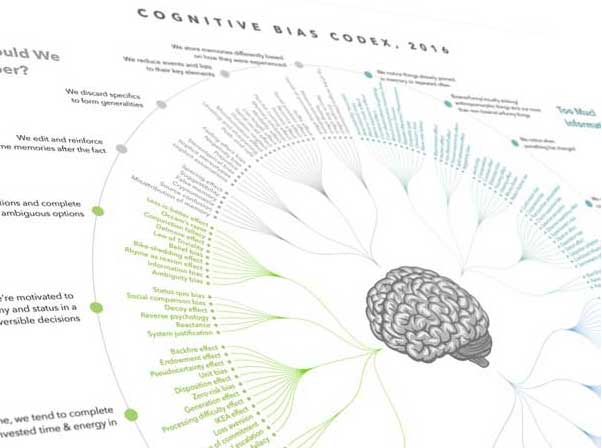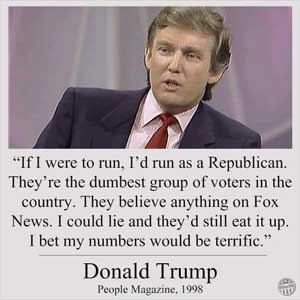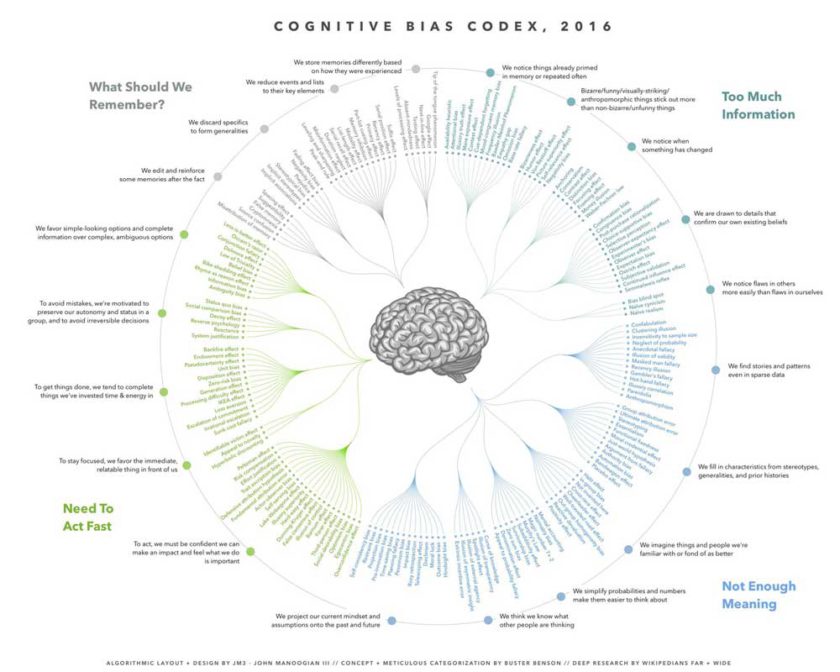 I’ve seen a chart being shared on social media that I do openly confess I like, so I’m highlighting it here. I did also wonder where it had originally come from, and so after some extensive investigation (I looked at the notes on the bottom of it) I found that the alpha source for it is a posting made on 1st Sept on Buster Benson’s website. There he not only presents you with his “Cognitive bias cheat sheet”, but he also takes the time to explain it.
I’ve seen a chart being shared on social media that I do openly confess I like, so I’m highlighting it here. I did also wonder where it had originally come from, and so after some extensive investigation (I looked at the notes on the bottom of it) I found that the alpha source for it is a posting made on 1st Sept on Buster Benson’s website. There he not only presents you with his “Cognitive bias cheat sheet”, but he also takes the time to explain it.
He starts by outlining what motivated him …
I’ve spent many years referencing Wikipedia’s list of cognitive biases whenever I have a hunch that a certain type of thinking is an official bias but I can’t recall the name or details. It’s been an invaluable reference for helping me identify the hidden flaws in my own thinking. Nothing else I’ve come across seems to be both as comprehensive and as succinct.
However, honestly, the Wikipedia page is a bit of a tangled mess. Despite trying to absorb the information of this page many times over the years, very little of it seems to stick. I often scan it and feel like I’m not able to find the bias I’m looking for, and then quickly forget what I’ve learned. I think this has to do with how the page has organically evolved over the years.
Hey yes, I’m with him on that one, so he took all the biases listed, then broke them all down into four categories. Others agreed. In fact, the Wikipedia page he refers to as a “tangled mess” has been modified and now not only includes his cheat sheet but also reflects some of his categorisations, so it is no longer what it once was.
There are specific cognitive biases that are well-known and to some degree well-understood by a good percentage. For example if I used the term “Conformation Bias” (The tendency to search for, interpret, focus on and remember information in a way that confirms one’s preconceptions), then most will instantly know what I mean without any need to look it up. However, peruse the full list you will find many that you have never heard of.
Breaking it all down
Since Buster was on Paternity leave for four weeks he had a bit of time. He took the full list of 175 and proceeded as follows …
I started with the raw list of the 175 biases and added them all to a spreadsheet, then took another pass removing duplicates, and grouping similar biases (like bizarreness effect and humor effect) or complementary biases (like optimism bias and pessimism bias). The list came down to about 20 unique biased mental strategies that we use for very specific reasons.
I made several different attempts to try to group these 20 or so at a higher level, and eventually landed on grouping them by the general mental problem that they were attempting to address. Every cognitive bias is there for a reason — primarily to save our brains time or energy. If you look at them by the problem they’re trying to solve, it becomes a lot easier to understand why they exist, how they’re useful, and the trade-offs (and resulting mental errors) that they introduce.
So what are his four general problems that Cognitive Biases try to overcome?
He digs into each in detail. In summary, they are …
- Too much information
- Not enough meaning
- The need to act fast
- What should we actually remember
Each of these challenges leads to the natural emergence of solutions within out brains that enable us to cope and thus address the problem.
Let’s work one example. Since I’ve already mentioned “Conformation Bias” we can use that.
We face information overload so we need effective filters to enable us to handle that. There is no choice about this, not filtering is not an option, hence our brains naturally opt to be selective. Inevitably natural selection does play a role because if our information filters yield results that give us a survival advantage, then those are the filters that will thrive.
We all carry within our heads specific conclusions about many things, for example politics and religion. These are often conclusions that we have invested in for cultural and/or emotional reasons, and anything that conflicts can be highly disruptive to our existing social bonds, hence retaining those bonds does yield specific survival advantages. Confirmation Bias is a filter that enables us to ignore anything that conflicts with our pre-existing beliefs.
 To work a specific example, there is a Facebook meme that contains a picture of Donald Trump along with a 1998 quote from him saying that Republicans are the dumbest group, so if he was to ever run for office then he would run as a Republican candidate. As you might imagine, many non-Trump folks share that because it strikes a chord, and of course Trump supporters will naturally discard it as bullshit. Truth is irrelevant, this filtering is an emotional bias, specifically confirmation bias.
To work a specific example, there is a Facebook meme that contains a picture of Donald Trump along with a 1998 quote from him saying that Republicans are the dumbest group, so if he was to ever run for office then he would run as a Republican candidate. As you might imagine, many non-Trump folks share that because it strikes a chord, and of course Trump supporters will naturally discard it as bullshit. Truth is irrelevant, this filtering is an emotional bias, specifically confirmation bias.
Le me place some emphases there – “Confirmation Bias” is not a truth filter. Almost every single thing asserted by Trump or Trump supporters regarding Hillary is pure myth. Their “Confirmation Bias” latches on to it all as fact and discards input from fact-checkers, while the Hillary supporters (such as myself) embrace the fact-checkers and happily discard the myths, not just because it is factual, but also because it aligns with what they believe. I would still however argue that only one side has a high degree of rationality in play. You agree of course, but is that a fact or is that confirmation bias? I did not specify which, you simply opted for one and assumed that is the one I also had in mind, and so is that also confirmation bias?
Key Point: This is not a Trump vs Hillary discussion, I’m simply using that rather emotive topic to illustrate how “Confirmation Bias” enables information filtering, and also to point out that truth plays no part in such a bias for either side.
If these Biases are useful tools, then what is the problem?
If you are reading this then there is a high probability that you are not a Trump supporter because I have been quite negatively vocal about Trump (Gosh, I wonder why).
If we briefly return to my previous example of Trump pointing out within a 1998 interview that Republicans are dumb then you will probably find that to be quite an enticing quote worth remembering and sharing. One small problem, it’s not actually true at all, he never said it.
When I first encountered the meme, I immediately embraced it as true and shared it, only to later discover the mistake I had made. I had shared a myth as fact because of confirmation bias. Yes, the irony is not lost on me that a meme criticising a chap who mostly promotes myths as fact is itself a myth.
We all have these biases, not because we are fundamentally flawed, but because they do often yield a distinct advantage. The price we pay is that it can also lead to such mistakes. If you are wondering why so many millions of voters can be so utterly stupid enough to vote for Trump and continue to support him despite everything that is known about him, then you will find that an understanding of human cognitive biases explains much.
Let’s expand upon the Trump example a bit and explore that.
Vast swathes of the population have truly suffered through circumstances that have carried them into the gutter. dot-com bubbles busting, the sub-prime crash and all that followed, the ongoing destruction of the middle class, etc…. Up pops a candidate who is clearly not perceived to be part of the establishment that has damaged them, so they latch on for emotional reasons. Once invested, confirmation bias (along with many other biases) kicks in and filters out facts that conflict with this narrative that has given them hope, so they embrace myths as truth that confirm their support.
Why?
Well, basically because a vote for Trump is a way of kicking the establishment that has damaged them, and they are not willing to let character flaws wash that opportunity away. They might have had almost everything else taken from them, but the one thing they still have is one vote, and so this is their opportunity to express a deeply felt anger. On 8th November it will feel ever so good if he wins, the ultimate FU to society.
Eventually the realisation that he will do nothing for them will finally sink in. It might take a day, or perhaps a week or maybe even a month, but it will happen, the dawning realisation that they have been conned once again.
It is not primarily about stupidly, nor is it fundamentally rooted within racism or misogyny, but instead it is about a deeply felt anger that finally finds an outlet. Confirmation Bias then dominates and so facts that conflict with the narrative are discarded while myths the confirm it are embraced as truth.
OK, so yes, that is a tad simplistic because the entire Trump phenomena is multi-faceted and multi-causal. The point is this – understanding human cognitive biases will help you to appreciate why people can be blinded to reality. Knowing what can happen is a useful tool to help work through such issues not just in others, but also within ourselves.
It might indeed be tempting to reach for easy answers such as “stupidity”, “racism”, or “misogyny”, but often the truth is far more complex.
